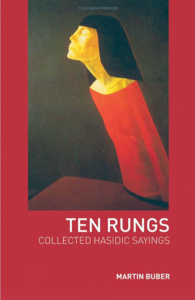A Ladder Is to Climb

THE SOFTCOVER BOOK, given to me at age thirteen, was called Ten Rungs by Martin Buber. The philosophical sayings were different from the philosophy books my dad used to read to me many evenings, yet meaningful as well. “In every man there is something precious, which is in no one else.” I just knew that was totally true even at my very young age.
Also, in this same paperback, it said: “For if someone like him had already been, there would be no reason for him to be in this world.” I still find, decades and decades later, these two comments to be almost opposite.
Not being self-absorbed, I did and still do feel unique. I could easily use biology to defend that no one else alive has my fingerprints or DNA. My personality, experiences, environment, health, emotional growth, as examples, set me apart and giving has always been more ”comfortable” than receiving. But many of these traits are universal. How I’ve used them may define “me.”
“For if someone like him had already been, there would be no reason for him to be in this world.” There was no one like my dad, and that isn’t because he was only in his forties when he died. But there is always a reason for someone like him to actually be in this world because he displayed sensitivity and caring for others, had a remarkable work ethic, and so forth. Shouldn’t there be justification for humankind in general to have the traits he had with his ability to love unconditionally, encourage others, and be an example of virtue? My notes in the margins of Ten Rungs showed I questioned this comment.
One of my granddaughters is taking a course on the human predicament. I mentioned that I had a predicament regarding humanism, and gave her these two quotes to think about. If there’s one person who is intelligent, compassionate, generous, selfless, and so forth, shouldn’t the quote about not having another like him be totally disregarded? Shouldn’t we want him cloned? He (or she) wouldn’t lose the precious uniqueness since we come to our values from many routes, but I see more circumstances that call for the special substance of quiet greatness than only individuality.
The book my dad read to me was from the Little Journeys to the Homes of the Great series—the volume called Philosophers. Elbert Hubbard put that together. I liked, by Socrates, “Knowing the man, we know what he would do; and knowing what he did, we know the man.” And “Life to him was a precious privilege, and what were regarded as unpleasant experiences were as much a part of life as the pleasant ones.” And this: “You know yourself by watching yourself to see what you do when you are thwarted, crossed, contradicted, or deprived of certain things supposed to be desirable.”
Oh, how valuable it is to actually notice our personal responses when we are contradicted and deprived! There’s an invisible mirror beginning in childhood. Yet it takes getting old to know that life is a privilege. The young and healthy see time as unlimited and expect vigor and happiness to extend the proverbial forever. Why shouldn’t they? It makes those quick-passing years special. Accepting that sadness and loss is as much a part of life as joy and gain also takes maturing. So when does that “precious-which-is-in-no-one-else” actually hit us as a truism? I guess the fact that it evolves makes it possible to deal with Buber’s “no reason for him to be in this world” and any acceptance of this is individual. Wouldn’t it be wonderful if we had another Albert Einstein to pen simple statements like these:
That we are here for the sake of other men—above all for those upon whose smile and wellbeing our own happiness depends…
Everyone should be respected as an individual, but no one idolized.
My grandchild’s school assignment allowed me to continue to expand my knowledge, and also dig into beliefs and agree or challenge what I assumed was automatic. Life is a privilege. Yes, Socrates, it still is.
